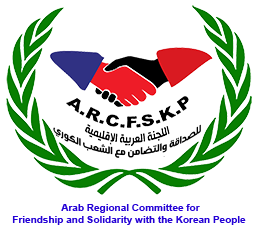Korean War and the US
AFRICAN COMMITTEE FOR FRIENDSHIP AND SOLIDARITY WITH THE KOREAN PEOPLE
Korean War and the US
The US instigated the puppet army of Republic of Korea to unleash an all-out armed invasion of the Democratic People’s Republic of Korea on the early morning of June 25, 1950, a Sunday.
When the news of the outbreak of the war was spread many people in the world believed the US claim that the DPRK would be routed within three days, or 72 hours. It was truly beyond imagination that the newly-founded, small county would stand up to the US, a victor in the Second World War and the ringleader of imperialism, and the allied imperialist forces toeing the US line.
But the war lasted three years, nor three days, and ended with an opposite result.
During the war, the US had hurled into the front a huge armed force, numbering over two million in total, including one-third of its ground force, one-fifth of its air force, and most of its Pacific Fleet, plus troops of 15 satellite countries, the ROK army and the remnants of the former Japanese army. Furthermore, it blackmailed the DPRK with an atomic bomb and devastated everything in the DPRK.
It committed carpet bombing in Pyongyang, for example, it dropped more than one bomb per head of its population, and 18 bombs per 1㎢ on the whole territory of the DPRK. The bombings were so devastating that the US claimed that the country would not be able to stand on its feet again within 100 years.
However, it was the US that sustained a great human and materials loss nearly 2.3times greater than that it had suffered in the four-year Pacific war. It lost over 1,567,120 men including 405,490 of its soldiers and tremendous amounts of combat and technical equipment including 12,220 aircraft. It had to sign an armistice agreement which was as good as an instrument of surrender for the first time in its history.
Clark, who signed the Korean Armistice Agreement as the representative of the UN forces under the order of the then US president Eisenhower, said after the signing that he had become the first US army commander who signed an armistice agreement without victory.
The US should have taken a lesson from its defeat in this war, but after the war, without giving up its wild ambition for world supremacy, it has resorted to maneuvers to ignite a new war against the DPRK. It has conducted large-scale joint nuclear war exercises with the ROK forces every year and never ceased nuclear threat and blackmail against the DPRK. It plans to hurl multinational forces into the Korean peninsula if a new war breaks out. As a result, the Korean peninsula has turned into one of the hottest spots in the world.
It is futile for the US to make all efforts to stamp out the DPRK’s rights to independence and existence.
The international community is of the opinion that the DPRK, which debunked the myth of “mightiness” of the US and brought about the beginning of its decline in the 1950s, is now driving the US to its final ruin.
The structure of confrontation between the DPRK and the US during the Korean war was that between a rifle and atomic bomb, but now it has changed into that between nuke and nuke.
Countering hard line with harder line is an invariable mode of response maintained by the DPRK. The harder line response consists of various scenarios including dealing a sudden preemptive strike of its own style from the ground, air, sea and under water. The US mainland as well as the military targets in ROK and the US military bases in Pacific operations area, including Japan proper, Okinawa and Guam are within the radius of strike by the Strategic Force of the Korean People’s Army.
The US is well advised to keep this resolute warning of the DPRK in mind, recognize the strategic position of the latter which has attained the status of a nuclear power in the East, the leading missile developer in Asia, and act with discretion.
The above highlight brings to say with certainty that the DPRK does not talk empty words and she is not of the type to suddenly collapse in the face of imperialist threats and blames.
Africa in general and Democratic Republic of Congo (DRC) in particular have a lot to learn from the DPRK’s confrontation with the US. Among other things, Africa and DRC should strive to emulate the DPRK’s national organization and her exemplary leadership. To get a well-organized society, the DPRK has imbedded her lively and unshakable soul into a movement that allows improving always people’s ideological and moral virtues, their working style, their cultural and engineering level to the point of making them worthy of social beings gifted with independence and creativity.
By his boundless loyalty to the leader of revolution both theoretically and practically, by his iron will, by his great intrepidity, by his unshakable faith, by his great insight and his characteristic judgement, the DPRK great Leader proves to be a role model for African Heads of State.
The US should never slight the DPRK’s declaration that it brought about the beginning of the US decline in the previous war, and if a new war breaks out, it will write the last page of the final ruin of the US.
Bazibuhe, Pascal Biringanine Secretary-General, DR Congo Email: [email protected]



